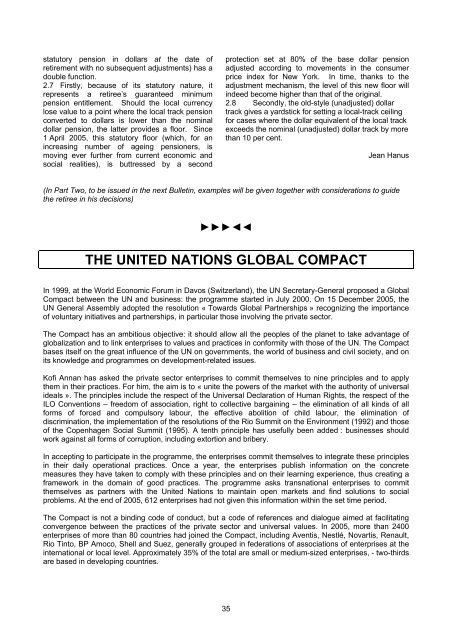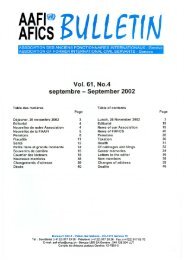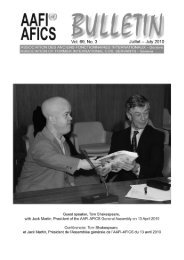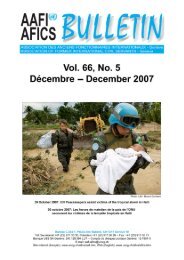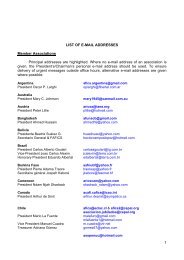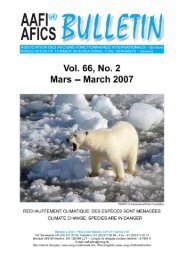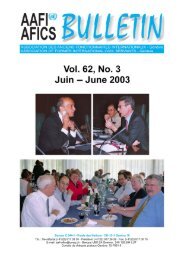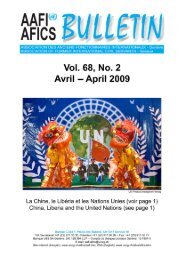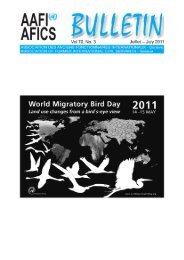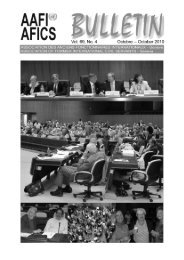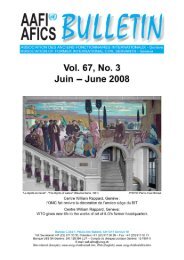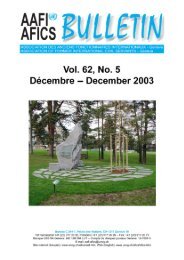VOL. 65, NO. 2 Mars â March 2006 - AAFI-AFICS, Geneva - UNOG
VOL. 65, NO. 2 Mars â March 2006 - AAFI-AFICS, Geneva - UNOG
VOL. 65, NO. 2 Mars â March 2006 - AAFI-AFICS, Geneva - UNOG
Create successful ePaper yourself
Turn your PDF publications into a flip-book with our unique Google optimized e-Paper software.
statutory pension in dollars at the date ofretirement with no subsequent adjustments) has adouble function.2.7 Firstly, because of its statutory nature, itrepresents a retiree’s guaranteed minimumpension entitlement. Should the local currencylose value to a point where the local track pensionconverted to dollars is lower than the nominaldollar pension, the latter provides a floor. Since1 April 2005, this statutory floor (which, for anincreasing number of ageing pensioners, ismoving ever further from current economic andsocial realities), is buttressed by a secondprotection set at 80% of the base dollar pensionadjusted according to movements in the consumerprice index for New York. In time, thanks to theadjustment mechanism, the level of this new floor willindeed become higher than that of the original.2.8 Secondly, the old-style (unadjusted) dollartrack gives a yardstick for setting a local-track ceilingfor cases where the dollar equivalent of the local trackexceeds the nominal (unadjusted) dollar track by morethan 10 per cent.Jean Hanus(In Part Two, to be issued in the next Bulletin, examples will be given together with considerations to guidethe retiree in his decisions)►►►◄◄THE UNITED NATIONS GLOBAL COMPACTIn 1999, at the World Economic Forum in Davos (Switzerland), the UN Secretary-General proposed a GlobalCompact between the UN and business: the programme started in July 2000. On 15 December 2005, theUN General Assembly adopted the resolution « Towards Global Partnerships » recognizing the importanceof voluntary initiatives and partnerships, in particular those involving the private sector.The Compact has an ambitious objective: it should allow all the peoples of the planet to take advantage ofglobalization and to link enterprises to values and practices in conformity with those of the UN. The Compactbases itself on the great influence of the UN on governments, the world of business and civil society, and onits knowledge and programmes on development-related issues.Kofi Annan has asked the private sector enterprises to commit themselves to nine principles and to applythem in their practices. For him, the aim is to « unite the powers of the market with the authority of universalideals ». The principles include the respect of the Universal Declaration of Human Rights, the respect of theILO Conventions – freedom of association, right to collective bargaining – the elimination of all kinds of allforms of forced and compulsory labour, the effective abolition of child labour, the elimination ofdiscrimination, the implementation of the resolutions of the Rio Summit on the Environment (1992) and thoseof the Copenhagen Social Summit (1995). A tenth principle has usefully been added : businesses shouldwork against all forms of corruption, including extortion and bribery.In accepting to participate in the programme, the enterprises commit themselves to integrate these principlesin their daily operational practices. Once a year, the enterprises publish information on the concretemeasures they have taken to comply with these principles and on their learning experience, thus creating aframework in the domain of good practices. The programme asks transnational enterprises to committhemselves as partners with the United Nations to maintain open markets and find solutions to socialproblems. At the end of 2005, 612 enterprises had not given this information within the set time period.The Compact is not a binding code of conduct, but a code of references and dialogue aimed at facilitatingconvergence between the practices of the private sector and universal values. In 2005, more than 2400enterprises of more than 80 countries had joined the Compact, including Aventis, Nestlé, Novartis, Renault,Rio Tinto, BP Amoco, Shell and Suez, generally grouped in federations of associations of enterprises at theinternational or local level. Approximately 35% of the total are small or medium-sized enterprises, - two-thirdsare based in developing countries.35


